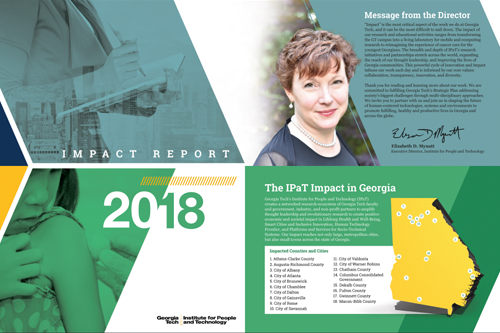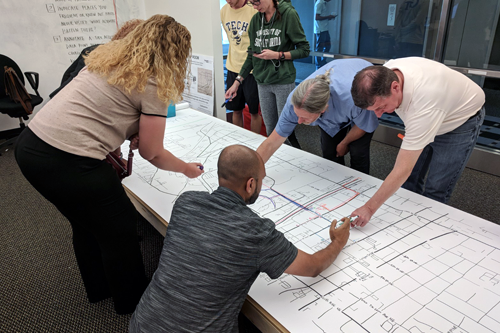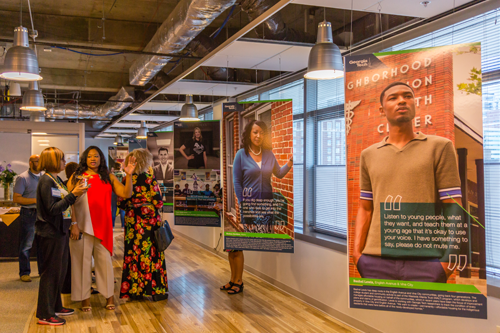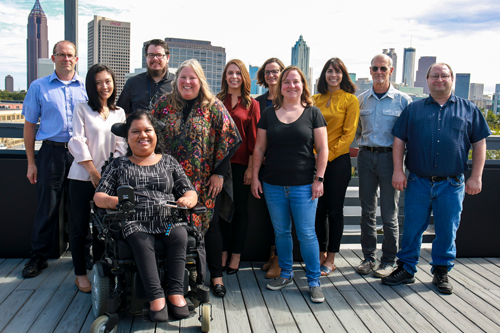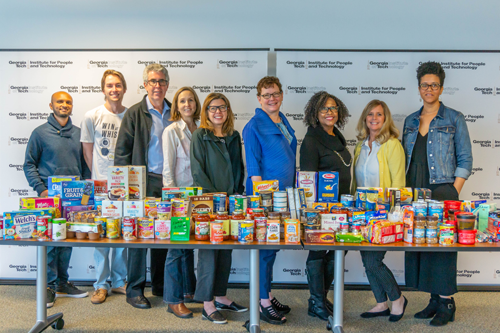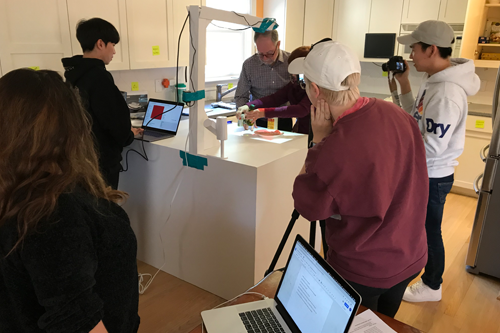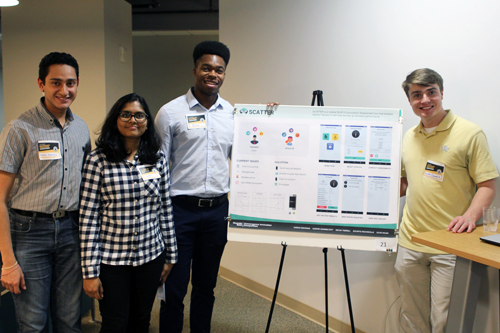IPaT 2018: A Year in Review
Jul 11, 2019 — Atlanta, GA
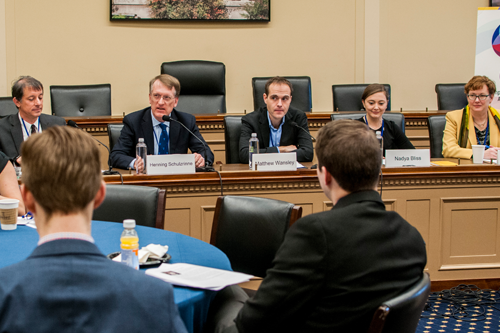
Beth Mynatt (far right) makes presentation at U.S. congressional briefing
Dear IPaT Community,
Happy holidays! We're quickly approaching the end of the year, a time for reflection and looking forward to the year ahead. Before we usher in 2019, we'd like to thank you for partnering with the Institute for People and Technology in our mission to shape the future of human-centered systems to promote satisfying, healthy and productive lives.
2018 was a year of change and new opportunities. This year we welcomed our new Executive Vice President for Research, Chaouki Abdallah, who returned to Georgia Tech to lead the Institute's research enterprise. We celebrated the lives of Georgians who inspire transformative research on our campus and throughout the state.
IPaT continued to engage faculty, students, and communities in new research initiatives, such as the Georgia Smart Communities Challenge, while supporting the success of ongoing projects like the renewal of TechSAge, a center devoted to improving the experience of aging for people with disabilities. Our “Year in Review” is just a glimpse into how your contributions are shaping the world. We’re looking forward to what we’ll accomplish in 2019 and beyond!
Thank you, and have a safe and enjoyable holiday season!
Elizabeth D. Mynatt
Executive Director, Institute for People and Technology at Georgia Tech
January
- On January 30, Beth Mynatt, IPaT executive director, co-organized and presented at a U.S. congressional briefing on intelligent infrastructure in Washington, D.C. The Computing Research Association sponsored the briefing, where Mynatt discussed key gaps that could prevent communities from reaping the economic rewards of infrastructure investments.
February
- As part of IPaT's efforts to better understand and support Georgia Tech research activities, we hosted three days of "office hours." IPaT leadership met with faculty and research groups across campus to discuss research needs and aspirations.
- IPaT and the Smart Cities and Inclusive Innovation initiative launched the Georgia Smart Communities Challenge. The challenge, open to all communities in Georgia, supports local governments with seed funding, technical assistance, and other resources as they plan and activate smart development. More than 60 Georgia communities expressed interest in the challenge and 17 submitted proposals.
March
- IPaT and the GVU Center hosted a lecture by Georgia Tech alumna Lena Mamykina on using personal data to facilitate self-management of diabetes. After graduating with her HCC Ph.D. in 2009, Mamykina joined the faculty at Columbia Medical School.
April
- For a second time, the Smart Cities and Inclusive Innovation team and the Georgia Municipal Association hosted the Georgia Mayor’s Leadership Forum. While the first forum focused on understanding the basics of smart cities, the latest meeting encouraged participants to discuss how to apply smart city practices to their cities. Representatives from several Georgia cities and counties participated, including Athens-Clarke County, City of Albany, Columbus Consolidated Government, City of Gainsville, Macon-Bibb County, City of Savannah, and the City of Warner Robins.
- Another year, another exciting semester of innovation and collaboration during the Spring 2018 Convergence Innovation Competition. IPaT and the Research Network Operations Center sponsored the competition's judging and demo event on April 12th in the categories of Climate Solutions, Active Aging, and Players and Fans.
- The theme of this year’s IPaT Industry Innovation Day was Intelligent Health — integrating advancements in science, technology, and design that create longer, healthier, and more fulfilling lives. Plenary speakers Chris Greer and Dr. Jordan Amadio spoke to attendees about 'What Makes a Smart City Healthy?' and 'Building Disruptive Ecosystems for Health Innovation.'
May
- In May, IPaT published the latest issue in the IPaT In-Depth series, which explores one research topic and the people who are transforming their fields. IPaT In-Depth: Sports Technology Innovation showed how Georgia Tech academic and athletic units are working together to advance ideas that benefit athletes on and off the field.
- Faculty and staff from across campus participated in our spring Horizons Workshop where we discussed the future of Interdisciplinary Research Institutes and brainstormed newspaper headlines that describe Georgia Tech accomplishments five years in the future.
June
- The cities of Albany and Chamblee, and Gwinnett and Chatham counties were selected for the inaugural Georgia Smart Communities Challenge. The communities' projects tackle housing, traffic congestion, shared autonomous vehicles, and sea level rise.
July
- Jennifer DuBose, associate director of the SimTigrate Design Lab, was promoted to principal research associate. She's the first person in the College of Design to be promoted to this rank, the highest in the faculty research track at Georgia Tech.
- TechSAge selected the winner of its design competition — Judy Kong from the California College of the Arts who designed 'Stand,' a cane to assist older adults in sitting and standing. The international competition encourages students to develop technologies that empower healthy aging.
- Students presented data-oriented solutions for civic problems, from public health to environmentalism, at the Civic Data Science (CDS)finale on July 19. The 10-week, National Science Foundation-funded summer program brings college students from across the country to Georgia Tech to use data science research and applications for direct civic and social impact. This year’s projects addressed gentrification, sustainable transportation, pest control, and environmental monitoring.
August
- In August, we published the first edition of the IPaT Impact Report. The report shows the breadth and depth of IPaT's research initiatives and partnerships stretching across the world, expanding the reach of our thought leadership, and improving the lives of Georgia communities.
- The GVU Center and IPaT have awarded six projects funding through the 2018-2019 Engagement Grants Program. The grants are designed to build new collaborations and strategic plans for new research areas and programs. The goal of this program is to engage researchers in thinking and working across disciplinary boundaries, as a means to generate the novel research questions and approaches required to address grand challenges.
- IPaT received an $86,000 grant in August from the National Endowment for the Humanities (NEH) to support The Digital Drawer: A Crowd-Sourced, Curated, Digital Archive Preserving History and Memory. The Digital Drawer project will pilot a platform and method of gathering, curating and disseminating crowd-sourced community memory, initially, the history of Georgia’s rural churches contained in endangered records in private collections dispersed across the state.
- As part of the Georgia Smart Communities Challenge, Georgia Tech researchers developed and are testing a pilot sensor network for measuring sea level flood risk during natural disasters and storms. The network will improve flood warnings, emergency response action plans and predictions for future flood events.
September
- In September, we held our bi-annual Town Hall Meeting & Networking Reception where we discussed strategic priorities and faculty opportunities for the fall 2018 semester.
- The IPaT Thursday Think Tank returned in the fall, with discussions on topics ranging from "The Reality of Poverty in a STEM Environment" to the "Atlanta Map Room." Thursday Think Tank is a weekly event where the IPaT community gathers to brainstorm about research and learn more about work currently underway.
- On September 6, Georgia Smart hosted more than 85 local government representatives, academic researchers, and industry representatives at the Georgia Tech Research Institute Conference Center for their Fall Georgia Smart Workshop. The workshop was the first opportunity for the four Georgia Smart teams to discuss their winning proposals.
- IPaT hosted the opening reception for the Everyday Georgia exhibit on September 27. Through the coupling of photographs and interviews, the project shares the personal stories of Georgians–their challenges and accomplishments, and their vital role in Creating the Next at Georgia Tech. More than 40 people attended the reception, including many of the two dozen people profiled for the project.
October
- As part of our IPaT Thursday Think Tank series, Steve Downs, chief technology and strategy officer for the Robert Wood Johnson Foundation moderated a discussion on 'Smart Cities, Smart Homes, and Smart Lives: What If We Optimized Them for Wellbeing?' The discussion focused on the values we'll bring to an era of connected devices, objects, systems, and infrastructure.
- The National Institute on Disability, Independent Living, and Rehabilitation (NIDILRR) has awarded the Georgia Institute of Technology and the University of Illinois at Urbana-Champaign a 5-year, $4.6 million grant to conduct research and development projects that support successful aging-in-place for people with long-term disabilities. The grant represents the second phase of RERC TechSAge, with continued collaboration from co-directors Jon Sanford and Tracy Mitzner at Georgia Tech, and Wendy Rogers at the University of Illinois at Urbana-Champaign (formerly a professor in Georgia Tech’s School of Psychology). Researchers and staff in the Center for Assistive Technology and Environmental Access (CATEA), the Interactive Media Technology Center (IMTC), and AMAC Accessibility Solutions, as well as health system and community organizations, will partner with TechSAge.
- Nicoleta Serban, professor in the School of Industrial and Systems Engineering at Georgia Tech, was selected to participate the Robert Wood Johnson Foundation’s Interdisciplinary Research Leaders program. The program supports engaged research crafted and conducted by innovative teams to explore a problem and apply a solution in real time, making an immediate positive impact in their home communities. Serban's contribution to this project is to provide an assessment of the value for healthcare at a child's residence or school to deliver mental and behavioral health services.
- On October 30, the City of Albany along with a team from Georgia Tech hosted a day-long engagement workshop in Albany as part of the Georgia Smart Communities Challenge. Several city department leaders gave demonstrations of the power of data portals, while Georgia Tech's Christopher Le Dantec and Omar Asensio led a discussion on desired project outcomes and how they drive the data needs of the program.
- During the month of October, the IPaT community donated food and toiletries to the Tech 4 Tech Food & Supply Drive. Thanks to your generous support we collected much-needed items for Georgia Tech students facing food insecurity, which we donated to the STAR Program's Klemis Kitchen.
November
- Emory University’s Brain Health Center, in partnership with the Georgia Institute of Technology, launched an innovative research and therapy program for people with mild cognitive impairment (MCI), which is often a precursor to Alzheimer’s disease. The James M. Cox Foundation and Cox Enterprises, Inc. are supporting the new MCI Empowerment Program with a $23.7 million gift.
- This semester, with increased attention globally on climate change and its effects, we added a “Climate Solutions” category to the Convergence Innovation Competition in partnership with the Georgia Tech Global Change Program. A second new category, “Active Aging,” promotes the vision that all people fully engage in life while sustaining relationships, independence, and quality of life. Finally, a category introduced during the Spring 2018 CIC returned in the fall. “Players and Fans” encompasses innovations that benefit athletes, artists, entertainers, esports gamers, fans, or owners, whether amateur, youth, or professional.
- The Johns Hopkins Research Symposium on Engineering in Healthcare brought together experts — including Beth Mynatt and TechSAge Co-Director Jon Sanford — to advocate for leveraging new and emerging technologies to deliver better health care. The 2018 symposium explored challenges and opportunities faced by aging adults and their care networks as they seek to live independently while maintaining their physical, mental, and emotional health.
December
- Georgia Tech and Newsweek sponsored a seminar, 'How Driverless Cars Will Change The World', which brought together experts from city governments, Silicon Valley, Detroit and elsewhere to discuss a world in which cars can drive themselves and how society is preparing for the arrival of driverless vehicles.
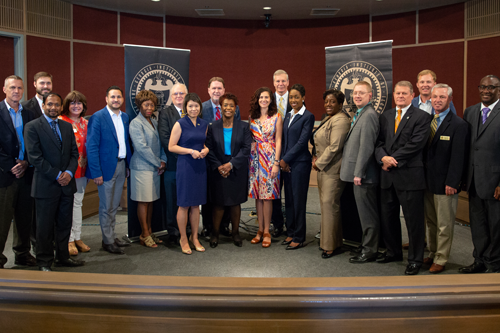
Georgia Smart Communities Challenge kickoff in Albany
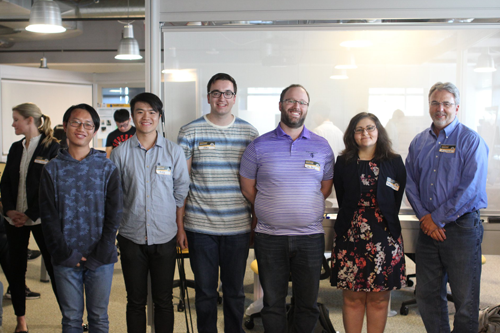
"Creating Smarter Systems for Health and Wellness" panel at 2018 IPaT Industry Innovation Day
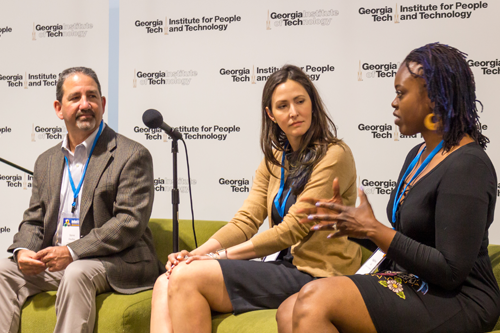
Photo courtesy: HRCGA / Scott Farrar
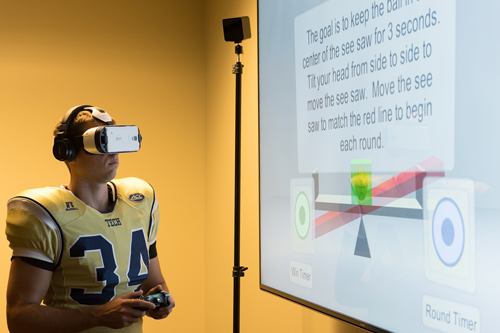
Georgia Tech TechSAge team members
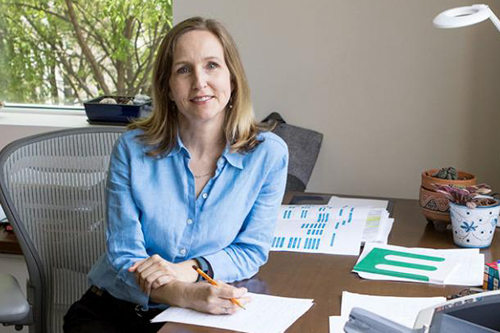
Students and MCI Fellows design elements of a therapeutic kitchen for the MCI Empowerment Program
